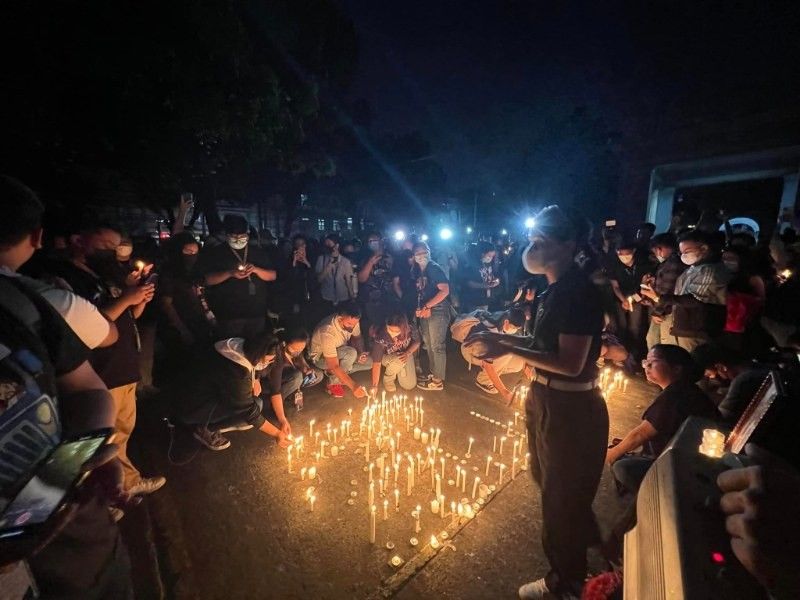Explainer: Will stiffer, broader penalties on fraternity hazing prevent deaths?

MANILA, Philippines — Blindsided again by a student’s death from fraternity hazing, senators on Tuesday floated the idea of expanding the scope of the Anti-Hazing Act to penalize fraternity officers and alumni who are aware of — but not necessarily witness to — the initiation rites carried out against new members.
Sen. Raffy Tulfo, who led lawmakers in grilling resource speakers in the legislative inquiry into the death of student John Matthew Salilig, said that amending the Anti-Hazing Act of 2018 to punish fraternity leaders even remotely aware of hazing but refuse to report to authorities would be a “deterrent” to deadly initiation rites.
“An initiation will not take place without the permission of the heads of a fraternity. So therefore, if hazing will take place, all officers should be automatically charged with reclusion perpetua,” Tulfo said in Filipino.
The Anti-Hazing Act was just revised in 2018 to outright ban hazing and impose stiffer penalties on persons involved in carrying out violent initiation rites. The 1995 version of the law was amended after the death of University of Santo Tomas law freshman Horacio Castillo III from the hazing rites of fraternity Aegis Juris.
But despite the amended Anti-Hazing Act, the police still recorded “14 or 18” alleged violations of the law since 2018, many of which were dismissed, according to Police Brig. Gen. Jose Melencio Nartatez during the hearing.
And barely five years later, another student, whose body was found naked and decomposing in an empty lot in Cavite, was found dead due to the fraternity initiation rites.
Following the death of Adamson University student Salilig, senators want to again crack the whip of the law to prevent fraternities from hazing its recruits.
Limitations in the Anti-Hazing Act of 2018
Schools that opt to ban fraternities outright to stamp out hazing may push greek organizations to become fly-by-night recruiters of students on campus, discussions during the Senate hearing showed.
This means that despite well-publicized fraternity and hazing bans in universities, a long history of fraternity culture could still exist as an open secret among students and alumni, placing hazing rites outside the jurisdiction of schools.
In Adamson University, fraternities have already been banned “for many, many years,” according to university president Fr. Marcelo Manimtim.
“They are not recognized, in other words, their activities are not covered by our policies,” said Adamson University’s Director for Student Affairs Jan Nelin Navallasca during the Senate hearing.
Navallasca added that as early as 2018, the university educated students about the Anti-Hazing Act as early as their orientations. “Our captive audience are usually 1st and 2nd year (students) in the (National Service Training Program) classes,” he said.
The Adamson school official admitted, however, that they were aware of the fraternity’s “alleged presence” on campus — a detail which lawmakers pounced on to ask why the university could not regulate their activities given their lack of school accreditation.
“What did you do? Did you call them, asked them to identify who the fraternity leader is (and) who the initiators are? Did you not tell them: initiation is not allowed, harassment is not allowed?” Tulfo asked Navallasca in Filipino.
“We don’t know them until they perform acts such as this,” Navallasca said.
Dela Rosa asked: Why not outright expel fraternity members organizing on campus?
“(Fraternities) have the constitutional right to form, so we have to tread a delicate balance,” said Anna Maria Abad, legal counsel of the Philippine Association of Colleges and Universities.
Under the 1987 Constitution, people have the right to "form unions, associations, or societies for purposes not conrary to law."
The Bill of Rights, however, also requires that “no person shall be deprived of life, liberty, or property without due process of law.”
Abad added that while several universities like Adamson have “outlawed fraternities and sororities,” schools could only exercise its responsibility over students “in respect to the academic and extracurricular activities recognized by the school.”
“This is the limit of our authority. This is part of the academic freedom,” said Abad, who is also dean of Adamson University’s College of Law.
Weak monitoring
Even the Commission on Higher Education (CHED) cannot easily penalize schools that will allow fraternities to continue its activities on campus, according to a director of the Commission on Higher Education for legal and legislative services.
“Under the law, CHED’s hands are tied, because we cannot impose: We have limited power to impose sanctions on schools (due to) academic freedom, higher education institution’s autonomy,” CHED director Frederick Farolan said in Filipino during the Senate hearing.
Farolan said that without “quasi-judicial powers” to sanction schools, the best that CHED can do is monitor cases.
“Unfortunately, we don’t have enough persons to monitor,” Farolan added.
Cases of fraternity-related violence are “fed into the system” of CHED, Farolan explained, and become part of the documents it will review to assess universities’ or colleges’ reapplication for programs or accreditation.
Harsher penalties not the answer
Filomin Gutierrez, a sociology professor at the University of the Philippines Diliman who has extensively studied fraternity cultures, pointed out that the current provisions of the Anti-Hazing Act already includes stiff penalties, such as reclusion perpetua or up to 40 years in prison — “the highest possible punishment for those involved in hazing.”
Laws and school bans on hazing can only do so much, according to Gutierrez.
What needs more attention is the “pervasive belief in the culture of hazing” that leads students to think that “harsh physical testing is a requisite to become a deserving member because previous generations of members went through the same,” Gutierrez said in an online message to Philstar.com.
“Fraternities proceed with initiation rites not thinking that they will kill the neophytes. They only meant to test,” Gutierrez said.
Gutierrez added that deaths from hazing can happen because the physical tests are “brutal (and) take place within a group dynamic where limits and boundaries are being pushed in order to prove or test abstract concepts such as commitment, toughness (and) manhood.”
During the Senate hearing, Daniel Perry, the “master initiator” — or leader — of the hazing rites conducted on Salilig, said that he knew his actions violated the Anti-Hazing Act of 2018.
Perry added that the hazing rites with Salilig was already the third time he had initiated new members of Tau Gamma Phi.
"It's just tradition," Perry said.
Cohort memory
Gutierrez said that another aspect of fraternity-related violence not covered by the law is students’ “limited cohort memory” of hazing.
In just four to five years, a completely new set of students takes the helm of a fraternity, which means new members do not have the memory of traumatic deaths or fatal incidents from hazing, Gutierrez said.
“The members who join, some of them were still in elementary or in high school when a (fraternity member) died several years ago. It’s always a fresh batch who does not think that someone could die, because there is no clear memory of a hazing death,” Gutierrez said in Filipino.
Victims of fraternity hazing themselves may feel opposed to the act, but the chances of anyone filing a complaint through the Anti-Hazing Law are slim, Gutierrez added.
“No neophyte or member who survived hazing will complain using the Anti-Hazing Law, because they themselves are now members, or the stigma for those who will complain is very high,” she added.
- Latest
- Trending




























